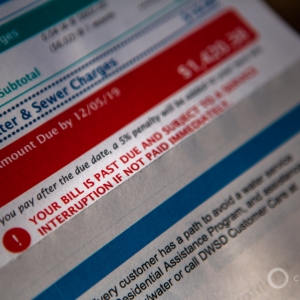The Stream, November 2, 2022: Russian Airstrikes Damage Critical Infrastructure in Ukraine, Cutting Off Water

The Tigris River leaves a green wake in its course through Iraq. Photo © J. Carl Ganter / Circle of Blue
YOUR GLOBAL RUNDOWN
- Russian airstrikes hit energy facilities in Ukraine earlier this week, cutting off water to most people in Kyiv.
- Protestors in western France object to a groundwater pumping project for agriculture.
- Texas plans its water future without adequately accounting for how a warming planet will affect its water supply.
Water scarcity rattles farmers in Iraq, who are drilling deeper wells to access water.
“Without rice and wheat, how can we live without income? We can migrate, but to where? The whole country is being stolen.” — Salah al-Faraon, a 75-year-old farmer who grows rice and wheat in Iraq.
Farmers in Iraq are desperate for water, but there’s not enough to go around. The Jordanian news site Al Bawaba reports that authorities, in an attempt at water management, restricted the area of land that al-Faraon could irrigate. For some farmers, the solution to scarce water mirrors the actions of the country’s oil industry: drill a well. The problem is that as more wells tap a limited resource, new wells must be drilled deeper and deeper to find water — a sign that the supply is shrinking.
Why It Matters: Wells serving many of the world’s rural households, farms, and factories are at risk of running dry if groundwater levels in their areas continue to decline. According to an analysis of 39 million wells, between 6 percent and 20 percent are no more than five meters below the top of the water table. The math in these scenarios is unforgiving. Drilling a deeper well is often an inadequate solution. It might spur a race to the bottom and worsen local groundwater drawdowns. Because more electricity is needed for pumping, deeper wells increase operating costs.
— Brett Walton, Interim Stream Editor
Recent WaterNews from Circle of Blue
- Election 2022: Water Regulation and Spending Punctuate State and Local Ballots – Groundwater regulation, legal rights to clean water, and spending measures highlight this election cycle.
- Communities Turned into Sewage Swamps — South Africa’s wastewater crisis is making life unbearable for its residents.
- In New Mexico, Partners Collaborate to End Siege from Megafires — Initiative in the Rio Grande basin intends to thwart catastrophic wildfires that wreck watersheds.
Drought in the American West
In their most recent 50-year plan to provide reliable water to the country’s second most populous state, Texas officials envisioned nearly two dozen new reservoirs. The Texas Tribune reports that the plan leaves out one thing: an analysis of how a warming climate would alter the rivers that would fill the reservoirs. Already there are signs of trouble as the state warms. A town along the Rio Grande had to request $2 million in federal funds this year to dredge Falcon Reservoir so that drinking water intakes could function. Another obstacle to reservoir development: local opposition to land seizures. Marvin Nichols Reservoir has been mentioned in state water plans since the 1960s. Building the reservoir would flood more than 66,000 acres in rural Red River County in order to supply the Dallas-Fort Worth area. The reservoir is now the county’s “defining political issue.”
In context: When It Rains, Texas Forgets Drought and Worsening Water Scarcity
Check out Circle of Blue’s drought coverage for more of the biggest headlines out of the drying American West.
This Week’s Top Water Stories, Told In Numbers
4,000
People in western France who protested against a plan to build groundwater storage ponds for farmers. The 16 basins will hold groundwater pumped in the winter for use during increasingly hot and dry summers, AFP reports. The protestors characterized the project as a “water grab” by agribusiness. The French government dispatched 1,000 police to the site to guard against sabotage — acts that officials deemed “eco-terrorism.”
On the Radar
Russian airstrikes damaged electric power facilities in Ukraine on Monday. Without power to run pumps, water service was cut to 80 percent of residents in the capital Kyiv, CNN reports. Water service in Kharkiv, Ukraine’s second largest city, was also affected.
The attacks are part of Russia’s broader strategy to target critical infrastructure. The BBC investigated accusations that Russian forces sabotaged a water supply pipeline in the southern Ukrainian city of Mykolaiv. The city is home to nearly 500,000 people. They have lived for six months without reliable drinking water in their homes. That’s because the city’s main water supply pipeline was damaged in April. To find out why, the BBC reviewed satellite photos and photos posted on social media. The British news agency shared them with security and military experts. Their conclusion was that Russian forces in the area blew up the pipeline. Deliberately targeting and damaging essential public infrastructure like water supply pipes is a violation of international law, according to legal experts.
More Water News
2022 U.S. Election: Even as drought forces water cutbacks, climate gets short shrift in midterm election
U.S. Drought: Along a withered Mississippi, a mixture of frustration, hope, and awe
India: Who is extracting Goa’s groundwater?
Ecosystems: For water quality, even a sliver of riverbank forest is better than none
Brett writes about agriculture, energy, infrastructure, and the politics and economics of water in the United States. He also writes the Federal Water Tap, Circle of Blue’s weekly digest of U.S. government water news. He is the winner of two Society of Environmental Journalists reporting awards, one of the top honors in American environmental journalism: first place for explanatory reporting for a series on septic system pollution in the United States(2016) and third place for beat reporting in a small market (2014). He received the Sierra Club’s Distinguished Service Award in 2018. Brett lives in Seattle, where he hikes the mountains and bakes pies. Contact Brett Walton






Leave a Reply
Want to join the discussion?Feel free to contribute!